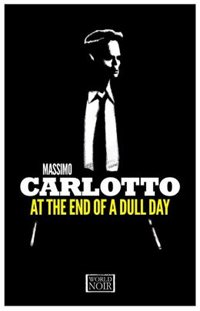 I've had a spate of bad luck this week. Rushing to work, I dropped my keys, and instead of landing on the sidewalk, they dropped down a storm drain. Then, when I stood up to address my colleagues, I suddenly remembered I hadn't combed my hair or changed the mismatched socks I pulled on to fetch the morning paper. Back home and locked out of my house, I wriggled in head first through a tiny window, to the great excitement of my dogs, and bloodied my lip when my face hit the floor.
I've had a spate of bad luck this week. Rushing to work, I dropped my keys, and instead of landing on the sidewalk, they dropped down a storm drain. Then, when I stood up to address my colleagues, I suddenly remembered I hadn't combed my hair or changed the mismatched socks I pulled on to fetch the morning paper. Back home and locked out of my house, I wriggled in head first through a tiny window, to the great excitement of my dogs, and bloodied my lip when my face hit the floor.I figure I'm due for good luck now. Have you noticed luck—both good and bad—likes threesomes? That's why I've gathered some reading sets of threes.
Sometimes I let my appetite for food dictate my reading. This weekend, I have a hankering for hearty pasta and red wine, so Gianrico Carofiglio's The Silence of the Wave (trans. from the Italian by Howard Curtis, Rizzoli Ex Libris, 2013) sounds good. It's a moving, character-driven novel featuring Roberto Marias, a depressed, former undercover cop, and Emma, a young mother, who meet because they share the same psychiatrist.
At the End of a Dull Day, by Massimo Carlotto (trans. from the Italian by Antony Shugaar, Europa, 2013), has been described as a "brutal noir thriller," but fun to read. A terrorist and criminal, Giorgio Pellegrino, attempts to turn over a new leaf. When his efforts lead to his betrayal, Pellegrino decides to double down and go bad in a Very Big Way.
Andrea Camilleri's Inspector Salvo Montalbano is always a delightful accompaniment to a plate of spaghetti. Treasure Hunt (trans. from the Italian by Stephen Sartarelli, Penguin, 2013) marks Montalbano's 16th appearance. In this book, Montalbano is challenged by a series of entertaining and bizarre riddles after Gregorio and Caterina Palmisano attempt to make the citizens of Vigata repent of their sins. Bravo.
I have an unlimited appetite for satire, droll narration, and books that make my head spin. Upamanyu Chatterjee's English, August: An Indian Story involves slacker/stoner Agastya Sen's training as a District Collector (a type of borough manager) in the village of Madna, which is, of course, hilariously mismanaged and hotter than Hades. Since nobody there knows Agastya, he is free to make up all sorts of nonsense about himself. This novel is for people who loved J. P. Donleavy's The Ginger Man, and it sounds like perfect bathtub fare for those who like to splash while reading. Or, for those who like to splash Oreos into milk while reading.
How is it I haven't yet read the eccentric classic All About H. Hatterr by G. V. Desani? It's an examination of colonial India, the British Empire, and philosophy wrapped up in a very nutty extravaganza of wordplay and adventures as H. Hatterr travels to seven Indian cities, absorbing seven lessons on Life from seven sages. Or something.
Last year, I enjoyed Wolf Haas's The Bone Man (see review here), and now Melville International Crime has published the first Simon Brenner series book, Resurrection (trans. from the German by Annie Janusch). This time, private eye Brenner travels to Zell, the capital city of Pinzgau, at the request of an insurance company, to tackle the supposedly accidental deaths of a rich American couple in their 80s, who froze to death on the ski lift operated by their son-in-law. (If this is murder, this son-in-law is a cold-hearted, low-down hound.) I'm pleased to report that The Bone Man's sardonic, omniscient narrator tells us about this investigation, too.
Don't you like poking around in your family's junk drawer? This is a joy perhaps unknown to super-organized people. Ours houses a dizzying array of junk, including a duck call, a collar that fit our 9-year-old dog when she was a puppy, and a wonderfully smooth stone from the ocean. This trio of books is similarly a catch-all.
Complex family dynamics may have led to murder in Linn Ullmann's The Cold Song (trans. from the Norwegian by Barbara J. Haveland, Other Press, April 4, 2014). Siri Brodal, a chef; her novelist husband Jon Dreyer; their two daughters; and their 19-year-old nanny are staying with Siri's mother at her seaside house in rural Norway, when boys digging for buried treasure find more than they bargained for.
Darragh McKeon's All That Is Solid Melts into Air (Perennial/HarperCollins, April 29, 2014) is set in 1986 against the backdrop of the disaster at the Chernobyl power plant. Moscow physician Grigory Ivanovich Brovkin treats survivors, and he is not left unscathed. This book is drawing comparisons to Anthony Marra's A Constellation of Vital Phenomena for the beauty of its writing.
I've marked May 13th on my calendar, because that's when Bird Box, by Josh Malerman (Ecco/HarperCollins), is available. Publishers Weekly states that it is comparable to Hitchcock's The Birds, "as well as the finer efforts of Stephen King and cult sci-fi fantasist Jonathan Carroll." The book is about a small Michigan community that faces the apocalypse in the form of strange creatures, who, when seen, inspire people to go mad and kill themselves. Holy moley.
I think I'm very lucky to have a chance to read some of these.









No comments:
Post a Comment